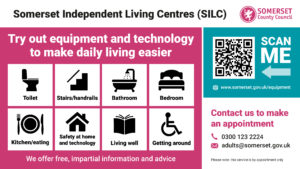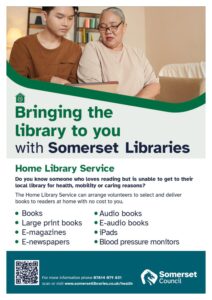Do you Care for Someone?
A carer is someone who without payment, provides support to a relative or friend who could not manage without help.
A carer for example:
- May give personal care, washing dressing, administering medication.
- May give practical help such as preparing meals, doing housework or shopping.
- Keep an eye on a person to keep them safe.
- Reminding and taking a person to medical appointments.
Just a few examples but this list could go on and on!
We would like to help to keep carers mentally and physically well to enable them to take good care of themselves and the person they care for.
At Queen Camel Medical Centre we have a carers register and urge carers to add themselves to the register, as when identified as an unpaid carer you would be entitled to a yearly flu vaccination. We also have Trudi Gibbons who is the carers champion in the surgery to offer you support and advice to help navigate the health and social care system and signpost you to organisations and groups to help.
If you think this is about you, please add yourself to the carers register by phoning the surgery or via reception.
_________________________________________________________________________
Are you looking after or providing support for a relative friend or neighbour? Are you being helped or supported by a relative friend or neighbour?
For an insight into being a carer and what you can do to find help, please have a look at the booklet below.
If Only I’d Known That, One Carer’s Experiences by Susan Hartnell-Beavis BEM
Useful Links:
Helpful Information for those living with Dementia
- Somerset Carers, who give support to all unpaid carers over 18 in Somerset. 0800 31 68 600 or www.somersetcarers.org
- Somerset NHS Foundation Trust Carers’ Assessments for those caring for people with mental health problems. Carers’ Development Manager 07774 207458 (Carers can be referred or self refer for a Carer’s Assessment providing the person that they support is registered with Somerset Partnership mental health services)
- Carers’ Information – Carers’ Service Administrator 01749 836633 / 07919 211361 or Carers – Carers – Somerset NHS Foundation Trust (somersetft.nhs.uk)
- CCS Village Agents – www.somersetagents.org Your local Village Agent can be contacted directly or by referral through your doctor’s surgery. Community Agents can only be contacted via referral from your doctor or Adult Social Services. They are problem-solving solution-finding super heroes!
- NHS England » Carers toolkit
- We’re here to make life better for carers – Carers UK
- Somerset Activity & Sports Partnership – Stronger 4 Longer (sasp.co.uk)
- Somerset NHS Foundation Trust Team – Somerset Carers
- Wellbeing South Somerset – Support to Improve Your Health and Wellbeing
- Somerset Independent Living Centres – Somerset Carers
- ProActive Somerset – ProActiveSomerset – Physical Activity on referral
Your GP needs to know so you can be offered the right information, support and access to services. GP surgeries have to compile information for the government about the numbers of carers attached to the surgery so your information will help them to do this.
For more information contact the practice.
- There is more information about help with day-to-day living because of illness or disability on the NHS website.


